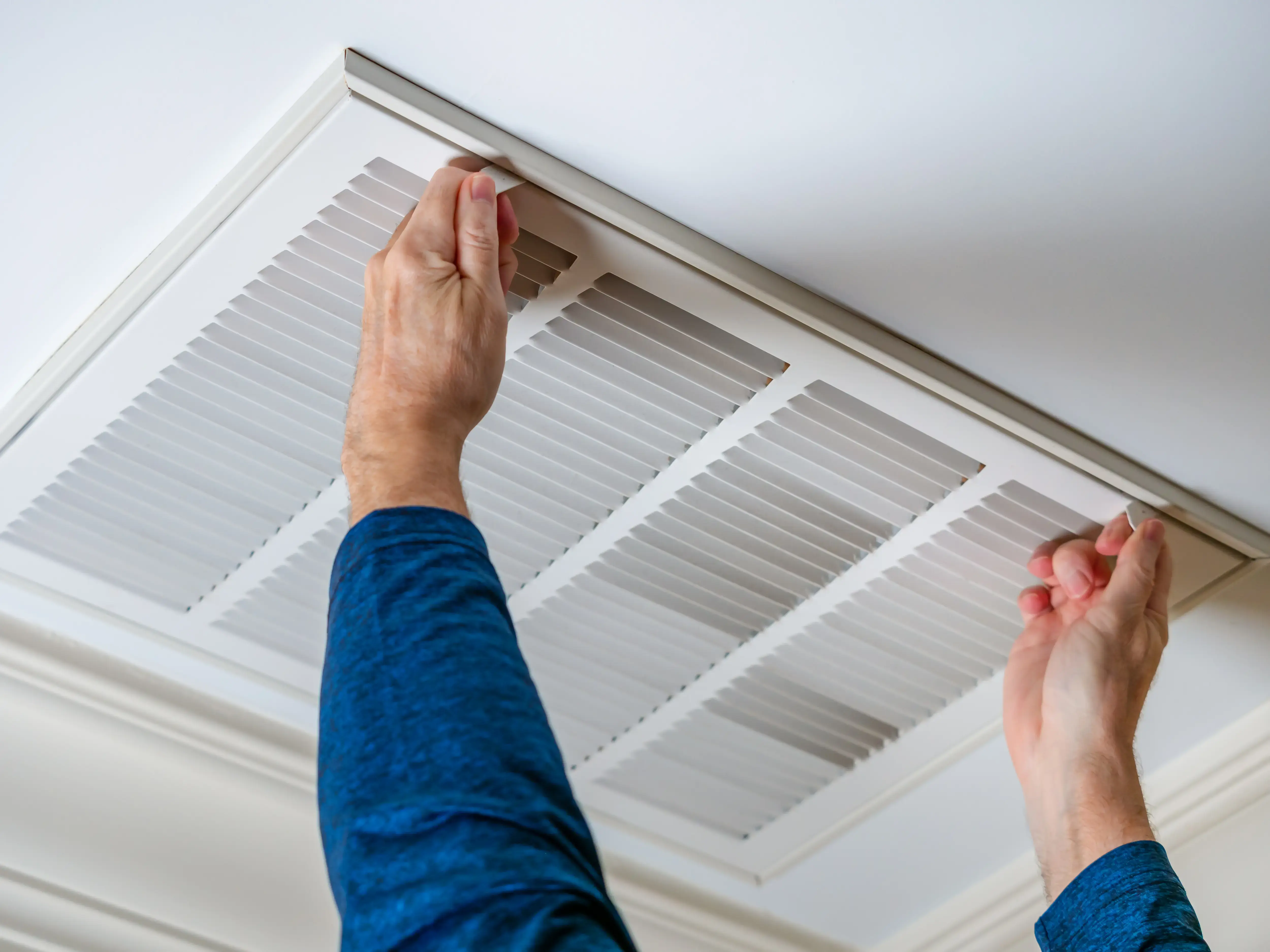11 HVAC Maintenance Tips Every Homeowner Should Know

Contact COIT for a professional cleaning!
Your HVAC system is the unsung hero of your home. Whether it's keeping you cool during those sweltering summer months or warming you up on a cold winter night, it works tirelessly to maintain a comfortable environment.
But like any machine, your HVAC system needs regular attention to run efficiently. That's where we come in.
At COIT, we specialize in cleaning and maintenance, and we’re here to guide you through essential HVAC maintenance tips that will save you money, improve efficiency, and extend the life of your system.
Here’s everything you need to know to keep your HVAC system in peak condition, all year long.
1. Change Your Air Filter Regularly
One of the simplest yet most important things you can do to maintain your HVAC system is to change your air filter regularly.
Over time, dust, pet hair, pollen, and other airborne particles accumulate in the filter, causing it to clog. This not only impacts your indoor air quality but also makes your HVAC system work harder to circulate air, leading to higher energy bills and a shorter lifespan for your system.
What Type of Air Filter Should You Use?
There are different types of air filters available, and the right one depends on your needs:
- Fiberglass Filters: These are affordable but need to be replaced more often (every 30 days). They offer basic filtration but aren’t great for removing allergens.
- Pleated Filters: These capture more debris than fiberglass and can last 60-90 days. They’re a good middle ground for most households.
- High-Efficiency Particulate Air (HEPA) Filters: HEPA filters are great for removing allergens and pollutants but may reduce airflow in certain HVAC systems. Be sure your system can handle this type of filter before using it.
- Washable Filters: These are reusable and eco-friendly, but require regular cleaning and are typically less efficient than disposable filters.
What’s a MERV Rating, and Why Does It Matter?
Filters are rated using the MERV scale (Minimum Efficiency Reporting Value), which indicates how well the filter captures particles. The higher the MERV rating, the more particles the filter can trap:
- MERV 1-4: Basic filtration, mostly capturing large particles like dust.
- MERV 5-8: Good for residential homes, capturing smaller particles like mold spores.
- MERV 9-12: Excellent for households with pets or allergies, trapping finer particles such as pollen.
- MERV 13-16: Typically used in hospitals and can trap bacteria and smoke particles. Check if your system can handle a filter with this high of a rating.
How Often Should You Change Your Air Filter?
You should replace your air filter every 1-3 months. However, if you live in a high-pollen area, have multiple pets, or suffer from allergies, it’s a good idea to check the filter monthly. If it looks dirty, go ahead and change it.
Pro Tip: Replace your filter every 1-3 months. If you have pets or live in a high-pollen area, check monthly.
2. Clean and Inspect Your Outdoor Unit
Your HVAC system’s outdoor unit (also known as the condenser or heat pump) is exposed to the elements year-round.
Leaves, dirt, and other debris can build up around it, blocking airflow and reducing efficiency. Cleaning this unit ensures it runs smoothly and helps avoid costly repairs down the road.
Step-by-Step Guide for Cleaning Your Outdoor Unit:
- Turn off the Power: Always start by switching off the power at the breaker box to avoid any electrical mishaps.
- Clear Debris: Use a soft brush or a vacuum with a brush attachment to remove debris like leaves, dirt, and grass clippings from around the unit.
- Clean the Fins: The fins on your condenser coil can get clogged or bent. Use a fin comb or a soft brush to straighten them and remove any dirt buildup.
- Check for Damage: While cleaning, inspect the unit for bent fins, leaks, or unusual noises. If you spot any of these issues, it may be time to call a professional for repairs.
Pro Tip: Trim back any plants, shrubs, or trees at least two feet away from the unit to ensure proper airflow.
3. Seal Air Leaks for Improved Efficiency
Air leaks around your home can significantly affect your HVAC system’s efficiency. When air escapes through leaks around windows, doors, or ductwork, your system has to work overtime to keep the temperature consistent.
How to Find and Fix Air Leaks:
- Identify Common Areas for Leaks: Common culprits include windows, doors, and outlets. You can check for leaks by holding a lit incense stick near potential problem areas. If the smoke wavers, you’ve found a leak.
- Seal with Caulk or Weatherstripping: For leaks around windows and doors, apply caulk or install weatherstripping. Make sure to seal any gaps around pipes or electrical wiring as well.
- Check Ductwork: Your HVAC ductwork can also leak air. If you suspect leaks, you can seal the gaps with foil tape or mastic sealant.
Pro Tip: Consider scheduling a professional energy audit. This can help you locate and seal hidden leaks, boosting your HVAC system’s efficiency and saving you money in the long run.
4. Clean the Coils for Optimal Performance
Your HVAC system’s coils—both the evaporator coil inside and the condenser coil outside—are critical components for transferring heat.
Over time, they can get dirty, which reduces efficiency and makes your system work harder than it should.
How to Clean Your Coils:
- Turn Off the Power: Always switch off the power before starting any maintenance work.
- Access the Coils: You may need to remove a panel on the indoor and outdoor units to access the evaporator and condenser coils.
- Clean the Coils: Use a soft brush to remove loose dirt, and then apply a coil cleaner spray (available at most hardware stores). For stubborn dirt, gently scrub the coils with a soft cloth or brush. Be cautious not to damage the fins.
- Straighten Bent Fins: If you notice any bent fins on your coils, use a fin comb to straighten them. This will improve airflow and system efficiency.
Pro Tip: Clean your coils at least once a year to keep your system operating at peak efficiency.
5. Schedule Seasonal HVAC Inspections
While DIY maintenance can go a long way, there’s no substitute for professional care. Regular seasonal inspections can catch small issues before they turn into costly problems.
What Happens During a Professional HVAC Inspection?
- System Check: A technician will inspect your system’s components, including the thermostat, blower, ductwork, and electrical connections.
- Refrigerant Levels: Your technician will check the refrigerant levels and top them off if needed to ensure efficient cooling.
- Safety Checks: The technician will inspect safety controls like the limit switch to ensure your system is operating safely.
Pro Tip: Schedule inspections in the spring and fall to get your system ready for summer cooling or winter heating.
6. Upgrade to a Programmable or Smart Thermostat
A programmable thermostat can help you save money by automatically adjusting your home’s temperature based on your schedule.
Better yet, consider upgrading to a smart thermostat, which can be controlled remotely through a smartphone app.
Benefits of a Smart Thermostat:
- Remote Control: Adjust your home’s temperature from anywhere, ensuring comfort when you arrive home.
- Energy Savings: A smart thermostat can learn your habits and adjust temperatures accordingly, saving you up to 10-15% on energy bills.
- Easy Integration: Many smart thermostats are compatible with voice-activated systems like Amazon Alexa or Google Assistant.
Pro Tip: We can help with installation and setup of your new smart thermostat if you’re not comfortable doing it yourself.
7. Keep Vents and Registers Clean
Blocked or dirty vents can restrict airflow, making your system work harder to heat or cool your home. Regularly cleaning your vents and keeping them clear of obstructions is an easy way to improve efficiency.
How to Maintain Your Vents and Registers:
- Vacuum Regularly: Use a vacuum with a brush attachment to remove dust and debris from your vents and registers.
- Check for Obstructions: Make sure that furniture, curtains, or rugs aren’t blocking your vents. Obstructed vents force your HVAC system to work harder to maintain the desired temperature.
- Inspect for Excess Dirt: If your vents get dirty quickly, it could be a sign that your ductwork needs cleaning. Consider professional duct cleaning to improve indoor air quality and system performance.
Pro Tip: We offer professional duct cleaning services that can enhance airflow and help your HVAC system run more efficiently.
8. Maintain the Blower Motor
The blower motor is essential for circulating air throughout your home.
Over time, it can accumulate dust and dirt, reducing efficiency and potentially causing overheating. Keeping the blower motor clean can improve your system’s performance.
How to Clean the Blower Motor:
- Turn Off the Power: As always, switch off the power before performing any maintenance.
- Access the Motor: Depending on your system, you may need to remove a panel to access the blower motor.
- Clean the Motor: Use compressed air or a soft brush to remove dust and debris. Be careful not to damage any components.
- Lubricate the Bearings: If your blower motor has oil ports, apply a few drops of oil to keep the bearings lubricated and reduce wear.
Pro Tip: Not comfortable cleaning the blower motor yourself? No worries—our team can handle that for you.
9. Clean and Inspect the Condensate Drain Line
Your HVAC system’s condensate drain line removes excess moisture from the system. Over time, this line can become clogged with mold, algae, or debris, which can cause water damage or system failure.
How to Clean the Condensate Drain Line:
- Locate the Drain Line: The condensate drain line is usually a PVC pipe located near your indoor unit.
- Flush the Line: Use a solution of water and vinegar or a commercial cleaner to flush the line and remove any buildup.
- Check for Leaks: While cleaning, inspect the drain line for leaks or cracks. If you notice any, it’s time to call in a professional for repairs.
Pro Tip: Regularly cleaning the condensate drain line can prevent water damage and keep your system running smoothly.
Your thermostat is the control center of your HVAC system. Ensuring it’s functioning properly and accurately reflecting the room temperature is essential for maintaining comfort and efficiency.
10. Test the Thermostat Settings
Your thermostat is the control center of your HVAC system. Ensuring it’s functioning properly and accurately reflecting the room temperature is essential for maintaining comfort and efficiency.
How to Test and Adjust Your Thermostat:
- Check Calibration: Use a thermometer to check if your thermostat is reading the room temperature accurately. If not, it may need recalibration or replacement.
- Test the Settings: Switch between heating and cooling modes to make sure your system responds correctly. If it doesn’t, there may be an issue with the thermostat or wiring.
- Replace Batteries: If your thermostat runs on batteries, change them at least once a year to avoid interruptions.
Pro Tip: IConsider upgrading to a smart thermostat for even better efficiency and remote control.
11. Perform Seasonal System Checkups
Beyond regular maintenance, it’s essential to do a seasonal checkup on your HVAC system to ensure it’s ready for the demands of each season. This can help you catch potential problems before they escalate into major repairs.
Seasonal System Checkup Checklist:
- Change Filters: Always start with checking and replacing your air filters.
- Inspect the Outdoor Unit: Clean and inspect your outdoor unit as described in tip #2.
- Check the Thermostat: Make sure your thermostat is set to the appropriate mode (heating or cooling) and functioning correctly.
- Test System Operation: Run your system through a full cycle and listen for any unusual noises. If something seems off, call in a professional.
Pro Tip: COIT offers seasonal maintenance packages to keep your system running smoothly all year round.
Final Thoughts
Regular HVAC maintenance doesn’t just keep your home comfortable—it also saves you money, extends the life of your system, and improves your indoor air quality. The key is to stay consistent.
If you’re unsure where to start or need professional assistance, we’re here to help! Whether you need an inspection, duct cleaning, or just advice, COIT has your back.
Call us today to schedule an appointment and ensure your HVAC system runs smoothly, no matter the season.



